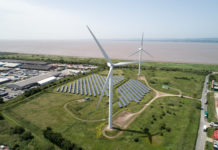
Decarbonising the UK economy within the next decade is neither official Labour policy nor likely to happen, according to shadow energy minister, Alan Whitehead.
The Labour party conference approved a motion to move “towards a path to net zero carbon emissions by 2030”.
Speaking at Aurora’s battery storage conference, Whitehead unpacked the party’s intentions.
“It is an aspiration … but it is a long way from a firm, researched and finally decided … corpus of policy,” said Whitehead.
But Labour “clearly wants to move to net zero well before 2050,” he added, “and we are fully committed to getting to it earlier than 2050.”
Asked if he thought net zero by 2030 is attainable, Whitehead replied that it is “feasible, by the early 2030s, that we will have in place a very low carbon economy and have those things in place that ensure net zero thereafter.”
Whitehead was speaking as Extinction Rebellion protesters demonstrated in central London. He was asked if their calls for total decarbonisation by 2025 are grounded in reality.
Extinction Rebellion, he said, represents “a tremendous weapon of conscience” that piles pressure onto policymakers and industry.
However, Whitehead said that even putting policies in place to ensure a long-term, sustainable commitment to a decarbonised economy in the timetable mooted by protesters was not possible.
“You can’t do that by 2025 … But you can end the sale of new petrol and diesel vehicles by about 2030, that is within the sales, ownership and scrappage cycle of a number of vehicles,” he suggested. “2025 is not, so we have to work out how to get these processes in place.”
A 2030 ICE ban, ten years earlier than the current government’s ambition, could save around 100 megatonnes of CO2, suggested Whitehead, “which is the difference between achieving and not achieving the fifth carbon budget.”
He urged protestors to keep up the pressure.
“We need to push as hard as we can. We are in a climate crisis. Pushing less hard is a dereliction of understanding of where we are.”
But Whitehead underlined that policy response to protest must be “couched in an organised way to achieve the best permanent outcome. Mechanisms need to be [developed and put] in place to keep the net zero economy going on a permanent basis.”
The shadow energy minister also moved to quell fears that Labour’s plans to renationalise utilities will restrict private finance from making a return on decarbonising the economy.
He pointed out that much of the UK’s offshore wind sector is already state-funded, albeit by the taxpayers of Denmark (Ørsted), Norway (Statkraft) and Sweden (Vattenfall), all of whom are enjoying good returns.
The amount of new offshore wind required – a fivefold increase by the early 2030s, according to Whitehead – needs “all hands to the pump,” he said.
“A state investment arm can take the initiative” in corralling public-private finance into profitable projects that can then fund further decarbonisation efforts, said Whitehead.
“We do not have a ‘pure’ market arrangement as far as offshore wind is concerned and we never have,” he added, “So it is imperative to throw everything at the investment required to get us [to the required upscale], whether state-led, or private.”
Related stories:
Fintan Slye: Inertia is being taken for granted; it will become much more important
Net zero: Aurora calls for carbon tax and transparent flex markets
Fluence: Lithium-Ion batteries can deliver six hour grid services
Mary Robinson: Commit to climate fight, then get angry with government and business
Follow us at @EnergystMedia. For regular bulletins, sign up for the free newsletter.



